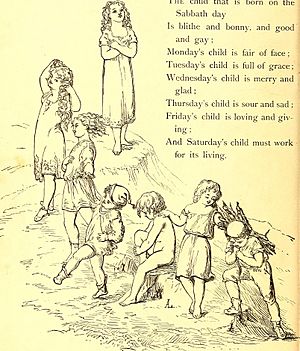Monday's Child facts for kids
Quick facts for kids "Monday's Child" |
|
|---|---|

As published in St. Nicholas Magazine, 1873
|
|
| Nursery rhyme | |
| Published | 1838 (first printed source) |
| Songwriter(s) | unknown |
"Monday's Child" is a well-known nursery rhyme that many children learn. It's a special kind of song called a fortune-telling rhyme. These rhymes are meant to guess a child's personality or future based on the day they were born. The "Monday's Child" rhyme also helps young kids remember the seven days of the week. Like many old rhymes, there are a few different versions of it.
What the Rhyme Says
Here are the most common words you'll hear in the "Monday's Child" rhyme today:
- Monday's child is fair of face
- Tuesday's child is full of grace
- Wednesday's child is full of woe
- Thursday's child has far to go,
- Friday's child is loving and giving,
- Saturday's child works hard for a living,
- And the child that is born on the Sabbath day
- Is bonny and blithe, and good and gay.
How the Rhyme Started
The "Monday's Child" rhyme was first written down in a book in 1838. It was found in a book called Traditions of Devonshire. Later, a collector named James Orchard Halliwell also wrote it down in the mid-1800s.
The idea of telling someone's future based on their birth day is much older than this rhyme. People have been doing it for hundreds of years! For example, in the 1570s, a writer named Thomas Nashe mentioned stories told in Suffolk that guessed what luck people would have based on their birth day. This shows that similar fortune-telling rhymes were popular a long time ago.
Over time, the exact words of the rhyme changed quite a bit. There was even some debate about what each day meant. For instance, in some older versions, "Wednesday's child is full of woe" was actually "Friday's child is full of woe." This might have been because some people thought Friday was an unlucky day. The fates of Thursday's and Saturday's children were also sometimes swapped around.
Music and Books
A composer named John Rutter set this rhyme to music for a choir. He included it in his collection called Five Childhood Lyrics, which came out in 1974. His version is sung a cappella, which means the singers perform without any musical instruments.
The rhyme has also inspired stories. It forms the main idea for a horror story called Black Week.

